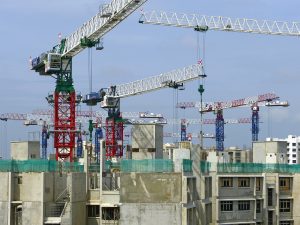The Ministry of Law said on Feb 6 that it will allow for the exemption of publicly listed housing developers with a substantial connection to Singapore from the Qualifying Certificate (QC) regime.
 Under the Residential Property Act (RPA), any housing developer that is not considered a Singapore company has to apply for a QC when it purchases residential land for development, other than from the Government. Under the QC regime, it is required to complete the development within five years and dispose of all units within two years of completion. This is to ensure that such housing developers build and sell the residential units in a timely manner, and do not hoard and speculate in residential land.
Under the Residential Property Act (RPA), any housing developer that is not considered a Singapore company has to apply for a QC when it purchases residential land for development, other than from the Government. Under the QC regime, it is required to complete the development within five years and dispose of all units within two years of completion. This is to ensure that such housing developers build and sell the residential units in a timely manner, and do not hoard and speculate in residential land.
A housing developer that is a Singapore company is not subject to the Qualifying Certificate regime.
Table of Contents
Currently, a Singapore company is defined in the RPA as one that is incorporated in Singapore, and all its directors and shareholders are Singapore citizens or Singapore companies. This definition however means that publicly listed housing developers that are essentially Singaporean will not be considered a Singapore company. If they have one foreign shareholder, they will not be considered a Singapore company.
The Ministry of Law said that it will allow publicly listed housing developers with a substantial connection to Singapore to be treated as a Singapore company within the meaning of the RPA when they acquire residential land for development. This will better align the QC regime and the objectives of the RPA.
Publicly listed housing developers can apply for exemption from the QC regime, on the basis that they have a substantial connection to Singapore. The application will be assessed by reference to the following criteria:
- Incorporation in Singapore;
- Primary listing is on the Singapore Exchange and principal place of business is Singapore;
- The chairperson and the majority of the company’s board are Singapore citizens;
- A significantly Singaporean substantial shareholding interest[1] in the company; and
- Track record in Singapore.
The Government announced that changes will be implemented with immediate effect and reflected in legislation later this year. Applications may be submitted to the Controller of Residential Property. For more information on application procedures, the Singapore Land Authority (SLA) may be contacted.
The Government said that it is making no changes to the existing property market cooling measures, which were put in place to keep private residential property price increases in line with economic fundamentals. In particular, all housing developers continue to be subject to the prevailing Additional Buyer’s Stamp Duty (ABSD) regime. The regime requires, among other conditions, developers to sell all units in a residential project within a specified timeline, failing which they will be subject to the ABSD.
In 2018, in replying to a parliamentary question asking “how much Additional Buyer’s Stamp Duty (ABSD) fees and Qualifying Certificate (QC) extension charges have been paid by developers each year since the rules were implemented;how many unsold residential property units have been subjected to both ABSD fees and QC charges, categorised by years of vacancy as at 31 December 2017; and what is the projected number of unsold residential property units that will be subjected to these fees and charges in 2018?”, the Minister for National Development replied saying:
“As of 31 Dec 2017, developers have paid about $200 million in Additional Buyer’s Stamp Duty (ABSD) fees, and about $180 million in Qualifying Certificate (QC) extension charges, since the regimes were implemented. As of 31 Dec 2017, no residential development has been subjected to both ABSD and QC extension charges on their unsold units. Around 80 developments (with a total of about 750 unsold units) could be subjected to these fees and charges in 2018 if either or both disposal conditions are not met.”
How to apply for a Qualifying Certificate?
You are required to submit an online application. A non-refundable fee is payable.
Who can apply for a Qualifying Certificate (QC)?
A housing developer who intends to purchase restricted property to construct flats or dwelling house for sale.
A housing developer means:
- (a) an individual who is not a Singapore citizen; or
- a foreign company, a foreign limited liability partnership or a foreign society; or
- a Singapore company, limited liability partnership or society which is not holding a clearance certificate.
What are the conditions attached to a QC?
- Complete the construction and obtain the Temporary Occupation Permit or Certificate of Statutory Completion within 5 years from the date of issue of the QC or the collective sale order, whichever is applicable;
- Dispose of all the residential units within 2 years from the date of issue of the Temporary Occupation Permit or Certificate of Statutory Completion, whichever is earlier;
- Must not, without approval, change the shareholding of the housing developer after QC is issued;
- Must not, without approval, sell the land in its vacant or undeveloped state; and
- Provide security (Banker’s Guarantee of at least 10% of purchase price of land).
What if the housing developer is not able to complete the housing development within the 5-year period?
It is required to submit an online application for variation of condition for an extension of time to complete the housing development. A non-refundable application fee is payable. The extension charge payable for an extension of time is – 8% of the purchase price of the land for the first year extension, 16% for the second year of extension and 24% for the third and subsequent years.
What if the housing developer is not able to sell all the units in the development within the 2-year period?
It is required to submit an online application for variation of condition for an extension of time to dispose of the units in the development. A non-refundable application fee is payable. The extension charge payable for an extension of time is – 8% of the purchase price of the land for the first year extension, 16% for the second year of extension and 24% for the third and subsequent years. The number of unsold units will be taken into consideration when computing the charge.






